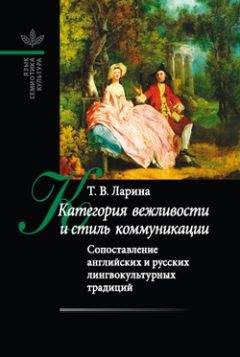Ознакомительная версия.
Шаманова 2002 – Шаманова М. В. К изучению категории общение в русском сознании // Язык и национальное сознание. Вып. 3. Воронеж: Истоки, 2002.
С. 56–62.
Шамьенова 2000 – Шамьенова Г. Р. Принцип вежливости как особая коммуникативно-прагматическая категория в русском речевом общении: Автореф. канд. филол. наук. Саратов, 2000.
Шаховский 1987 – Шаховский В. И. Категоризация эмоций в лексико-семантической системе языка. Воронеж: Изд-во Воронеж. ун-та, 1987.
Шаховский 1996 – Шаховский В. И. Эмоциональные культурные концепты: параллели и контрасты // Ред. В. Карасик. Языковая личность: культурные концепты. Волгоград: Перемена, 1996.
Шаховский, Сорокин, Томашева 1998 – Шаховский В. И., Сорокин Ю. А., Томашева И. В. Текст и его когнитивно-эмотивные метаморфорзы (межкультурное понимание и лингвоэкология). Волгоград: Перемена, 1998.
Шаховский 2008 – Шаховский В. И. Лингвистическая теория эмоций. М.: Гнозис, 2008.
Шмелев 2002 – Шмелев А.Д. Русская языковая модель мира: Материалы к словарю. М.: Языки слав. культуры, 2002.
Шубарт 1997 – Шубарт В. Европа и душа Востока. М.: Альм. «Рус. идея», 1997.
Шульженко 1992 – Шульженко Г. А. Просьба и сопровождающие ее элементы речевого этикета (к проблеме интенционального смысла единиц речевого этикета в прагматике диалога): Автореф. … канд. филол. наук. Саратов, 1992.
Юдина 2003 – Юдина Н. В. Ты да я, да мы с тобой (к вопросу об отражении в языке русской идеи соборности) // Филология и культура: Мат-лы IV Междунар. науч. конфе. 16–18 апреля 2003 г. / Отв. ред. Н. Н. Болдырев. Тамбов: Изд-во ТГУ им. Г. Р. Державина. С. 195–197.
Юнг Кьюнг-Ю. – Юнг Кьюнг-Ю. Не просто слова: Социальные модели и использование форм вежливости в корейском языке // Жанры речи: Сб. науч. ст. Саратов: Изд-во ГосУНЦ «Колледж», 2005. Вып. 4. Жанр и концепт. С. 199–217.
Юнг 1992 – Юнг К. Г. Об отношении аналитической психологии к поэтико-художественному творчеству // Феномен духа в искусстве и науке. М., 1992.
Яицкая 1999 – Яицкая Т. В. Русский речевой этикет (категория вежливости) и способы его выражения в драматургии А. Н. Островского: Автореф. дис. … канд. филол. наук. Таганрог, 1999.
Яковлева 1994 – Яковлева Е. С. Фрагменты русской языковой картины мира (модели пространства, времени и восприятия). М.: Гнозис, 1994.
Яновая 2002 – Яновая О. А. Номинативно-коммуникативный аспект обозначения улыбки как компонента невербального поведения (на материале современного английского языка): Автореф. дис. канд. филол. наук. Киев, 2002.
Adler et al. 1997 – Adler, Ronald B., G. Rodman. Understanding Human Communication.
Harcourt Brace College, 1997. Adler 1980 – Adler M. J. A Pragmatic Logic for Commands. Amsterdam: Benjamins,
1980.
Agar 1994 – Agar M. Language shock: Understanding the Culture of Conversation. N. Y.: William Morrow and company, 1994.
Aijmer 1996 – Aijmer K. Conversational Routines in English: Convention and Creativity. L.: Longman, 1996.
Altman 1977 – Altman I. Privacy: culturally universal or culturally specific // Journal of
Social Issues. 33. 1977. P. 66–84. Ambady et al. 1996 – Ambady N., Koo J., Lee F., Rosenthal R. More than words: linguistic
and nonlinguistic politeness in two cultures // Journal of Personality and Social
Psychology. 70. 1996. P. 996—1011. Asante, Molefi, Gudykunst, William 1994 – Asante, Molefi K. and Gudykunst, William B.
Handbook of International and Intercultural Communication. Sage Publications, 1994. Aston 1995 – Aston G. Say 'Thank you': Some Pragmatic Constrains in Conversational
Closings // Applied Linguistics. Vol. 16. 1995. № 1. P. 57–86. Ayala 2001 – Ayala. SP de. FTAs and Erskine May: Conflicting needs? Politeness in
Question Time // Journal of Pragmatics. 2001. № 33. P. 143–169. Bach, Harnish 1979 – Bach K., R. M. Harnish. Linguistic Сommunication and Speech
Acts. Cambridge: The MIT Press, 1979. Bahns, Burmeister, Vogel 1986 – Bahns J., H. Burmeister, T. Vogel. The pragmatics of formulas in L2 learner speech: use and development // Journal of Pragmatics 10 (6).1986. P. 693–723.
Bayraktaroglu, Sifianou 2001 – Linguistic Politeness Across Boundaries: The Case of Greek and Turkish / A. Bayraktaroglu, M. Sifianou (eds.). Amsterdam; Philadelphia: John Benjamins. Pragmatics and Beyound Series, 2001.
Belyaeva-Standen 1996a – Belyaeva-Standen Y. Advice and Soviet: a cross-cultural perspective on speech acts // Proceedings of Berkeley Linguistic Society 22. 1996. P. 13–24.
Belyaeva-Standen 1996b – Belyaeva-Standen Y. In Russian do as you are told: cross-cultural pragmatics of Russian public directives // ACTR Newsletter. Winter 1996. P. 7—11.
Benson et al. 1988 – Linguistics in a Systematic Perspective / J. Benson, M. Cummings,
W. Greaves (eds.). North Holland: John Benjamins, 1988. Berger, Bradac 1982 – Berger C. R., Bradac J. S. Language and social knowledge:
Uncertainty in interpersonal relationships. L.: Edward Arnold, 1982. Besemeres, Wierzbicka 2007 – Besemeres M., Wierzbicka A. (eds.). Translating lives:
Living with two languages and cultures. St. Lucia: University of Queensland Press, 2007.
Blum-Kulka 1987 – Blum-Kulka S. Indirectness and politeness in requests: Same or different? // Journal of pragmatics. 1987. 11 (2). P. 131–146.
Blum-Kulka 1992 – Blum-Kulka S. The metapragmatics of politeness in Israeli society / Richard J. Watts, S. Ide, K Ehlich (eds.). Politeness in Language. Studies in History, Theory and Practice. Berlin: Mouton de Gruyter, 1992. P. 255–280.
Blum-Kulka, Olshtain 1984 – Blum-Kulka S., E. Olshtain. Requests and Apologies:
A Cross-Cultural Study of Speech Act Realization Patterns (CCSARP) // Applied
Linguistics 5. 1984. P. 196–213. Blum-Kulka, Danet, Gherson 1985 – Blum-Kulka S., Danet B., Gherson R. The language
of requesting in Israeli society // Forgas J. P. (ed.). Language and social situations.
N. Y.: Springer – Verlag, 1985. P. 113—39. Blum-Kulka, House, Kasper 1989 – Blum-Kulka S., House J. and Kasper G. Investigating Cross-Cultural Pragmatics: An Introductory Overview // S. Blum-Kulka, J. House, G. Kasper (eds). Cross-cultural pragmatics: Requests and apologies. Norwood; NJ: Ablex, 1989. P. 1—34.
Blum-Kulka, House 1989 – Blum-Kulka S., House J. Cross-cultural and situatio-nal variation in requesting behaviour / S. Blum-Kulka, J. House, K. Gabriel (eds.) Cross-cultural pragmatics: Requests and apologies. Norwood; NJ: Ablex, 1989.P. 123—54.
Bolinger 1967 – Bolinger D. The Imperative in English // To Honor Roman Jakobson: Essays on Occasion of his 70th Birthday. Janua Linguarum Ser. Major 31. The Hague, 1967. P. 335–362.
Braun 1988 – Braun F. Terms of Address: Problems of Patterns and Usage in Various
Languages and Cultures. Berlin: Mouton de Gruyter, 1988. Brislin 2000 – Brislin R. Understanding Culture's influence on Behavior. 2nd ed. L.:
Harcourt College Publishers, 2000. Brosnahan 1998 – Brosnahan L. Russian and English nonverbal communication. M,1998.
Brown, Levinson 1978 – Brown P., Levinson S. Universals in language usage: politeness phenomena // E. Goody (ed.). Questions and Politeness: Strategies in Social Interaction. N. Y.: Cambridge University Press, 1978. P. 56—289.
Brown, Levinson 1987 – Brown P., Levinson S. D. Politeness: Some Universals in Language Usage. Cambridge: Cambridge University Press, 1987.
Brown, Gilman 1989 – Brown R., Gilman A. Politeness theory and Shakespeare's four major tragedies // Language in Society, 18. 1989. P. 159–212.
Butler 1988 – Butler C. S. Politeness and semantics of modalised directives // J. Benson et al. (eds.). Linguistics in a Systematic Perspective. North Holland: John Benjamins,1988.
Byram 1997 – Byram M. Teaching and Assessing Intercultural Communicative Competence. Clevedon: Multilingual matters LTD, 1997.
Byram, Morgan 1994 – Byram M., Morgan C. Teaching and Learning Language and Culture. Clevedon: Multilingual matters, 1994.
Byram, Fleming 1998 – Language Learning in Intercultural Perspective: Approaches through Drama and Ethnography / M. Byram, M. Fleming (eds.). Cambridge University Press, 1998.
Cameron, Deborah 2000 – Cameron D. Good to talk? Living and working in a communicative culture. Sage Publications. L.: Thousands Oaks, 2000.
Carter, McCarthy 1997 – Carter R., McCarthy M. Exploring Spoken English. Cambridge: Cambridge University Press, 1997.
Cheepen, Monaghan 1990 – Cheepen C., Monaghan J. Spoken English: a practical guide. L.; N. Y.: Pinter Publishers, 1990.
Chen 1993 – Chen R. Responding to compliments: A contrastive study of politeness strategies between American English and Chinese speakers. Journal of Pragmatics. 1993. 20. P. 49–75.
Clark, Schunk 1980 – Clark H. H., Schunk D. Polite responses to polite requests //
Cognition. 8. 1980. P. 111–143. Clyne 1994 – Clyne M. Inter-cultural communication at work: cultural values in discourse.
Cambridge: Cambridge University Press, 1994. Coulmas 1981 – Coulmas F. «Poison to Your Soul»: Thanks and Apologies Contrastively
Viewed / F. Coulmas (ed.). Conversational routine: Explorations in Standardized
Communication Situations and Prepatterned Speech. The Hague; Paris; N. Y.: Mouton Publishers, 1981. P. 69–91. Coulmas 1981 – Conversational Routine: Explorations in Standardized Communication Situations and Prepatterned Speech / F. Coulmas (ed.). The Hague; Paris; N. Y.: Mouton Publishers, 1981.
Coulmas 1997 – The Handbook of Sociolinguistics / F. Coulmas (ed.). Oxford: Blackwell Publishers, 1997.
Coulmas 1991 – Coulmas F. New Perspectives on Linguistic Etiquette. Mouton de Gruyter, 1991.
Coupland, Coupland, Robinson 1992 – Coupland J., Coupland N., Robinson J. «How are you?»: Negotiating Phatic Communion // Language in Society 21. 1992. P. 201230.
Daikuhara 1986 – Daikuhara M. A study of Compliments from a cross-cultural perspective: Japanese and English // Working papers in Educational Linguistics. 1986.
2. P. 103–135.
Davies 1987 – Davies E. A contrastive approach to the analysis of politeness formulas //
Applied linguistics 8 (1). 1987. P. 75–78. Drazdauskiene 1981 – Drazdauskiene M. – L. On Stereotypes in Conversation. Their
Meaning and Significance // F. Coulmas (ed.). Conversational Routine: Explorations
in Standardized Communication Situations and Prepatterned Speech. The Hague;
Paris; N. Y.: Mouton Publishers, 1981. P. 55–68. Dundes 1980 – Dundes A. Interpreting folklore. Bloomington, 1980. Duranti 1997 – Duranti A. Linguistic Anthropology. Cambridge: Cambridge University
Press, 1997.
Downes 1998 – Downes W. Language and Society. Cambridge: Cambridge University
Press, 1998.
Economidou-Kogetsidis 2005 – Economidou-Kogetsidis M. «Yes, tell me, please what time is the midday flight from Athens arriving?»: Telephone service encounters and politeness. Intercultural pragmatics 3, V. 2, 2005. P. 253–273.
Edmondson 1981 – Edmondson W. J. On saying you're sorry // F. Coulmas (ed.). Conversational routine: Explorations in Standardized Communication Situations and Prepatterned Speech. The Hague; Paris; N. Y.: Mouton Publishers, 1981. P. 273–288.
Eelen 2001 – Eelen G. A.Critique of Politeness Theories. Manchester: St. Jerome's Press,
2001.
Eggins, Slade 1997 – Eggins S., Slade D. Analyzing casual conversation. L.; Washington: Cassel, 1997.
Eisenstein, Bodman 1986 – Eisenstein M., J. Bodman. I very appreciate: Expressions of gratitude by native and non-native speakers of American English // Applied Linguistics. 1986. 7(2). P. 167–185.
Eisenstein, Bodman 1993 – Eisenstein M., J. Bodman. Expressing Gratitude in American English / G. Kasper, S. Blum-Kulka (eds.). Interlanguage Pragmatics. N. Y.; Oxford: Oxford University Press, 1993. P. 64–81.
Ekman, Rosenberg 1997 – What the face reveals / P. Ekman, E. Rosenberg (eds.). N. Y.: Oxford University Press, 1997.
Ervin-Tripp 1976 – Ervin-Tripp S. Is Sybil there? The structure of some American English directives // Language in Society 5. 1976. P. 25–66.
Ervin-Tripp 1981 – Ervin-Tripp S. How to make and understand request // H. Parret, M. Sbisa (eds.). Possibilities and Limitations of Pragmatics. Amsterdam, 1981. P. 195209.
Ознакомительная версия.




